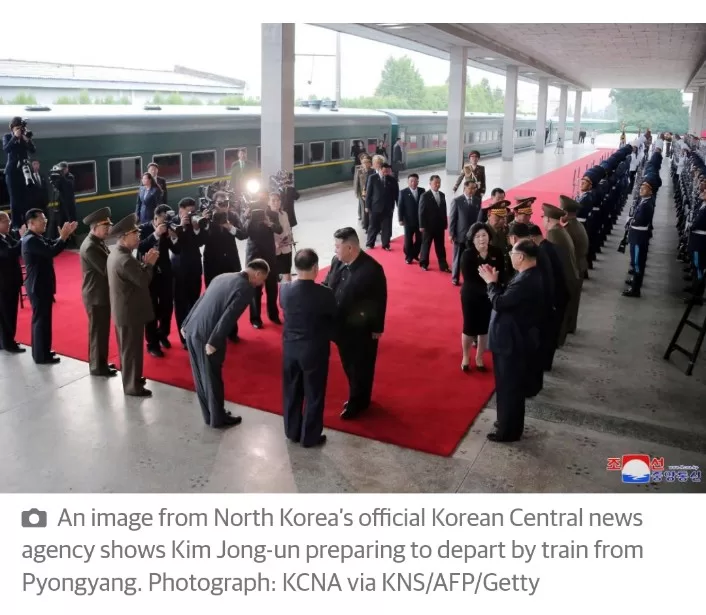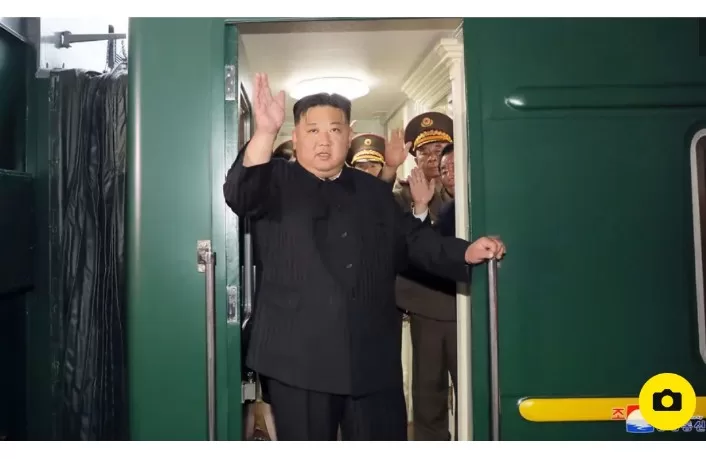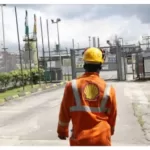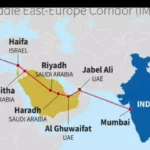Vladivostok, Russia: North Korean leader Kim Jong-un has embarked on a significant diplomatic journey, arriving in Russia via his heavily fortified armored train for a momentous summit with Russian President Vladimir Putin. The meeting is shrouded in speculation, with concerns raised about a potential arms deal between the two nations amidst the ongoing conflict in Ukraine.
Kim’s armored train reportedly pulled into Khasan station, the principal rail gateway connecting Russia’s Far East to North Korea, as confirmed by Japan’s Kyodo news agency, citing an unnamed Russian official source. The North Korean leader, accompanied by a delegation of senior officials from the arms industry and military, is poised for a possible encounter with Putin following the Eastern Economic Forum in Vladivostok, where the Russian President has already made his presence felt.
Kremlin spokesperson Dmitry Peskov has shed light on the purpose of Kim’s visit, emphasizing that it aims to bolster bilateral ties between the nations. He mentioned that initial negotiations would occur between the two delegations, with the potential for subsequent one-on-one discussions. Notably, neither leader is expected to hold a news conference.
Precise details regarding the meeting’s location and Kim’s participation in the economic forum remain undisclosed. However, Western concerns are rooted in suspicions that North Korea may intend to supply weapons to Russia, potentially replenishing armament stocks that have been depleted during the protracted 18-month conflict in Ukraine.
In response to these apprehensions, Peskov dismissed U.S. warnings about potential arms deals. Russian news agencies quoted him as stating, “As you know, while implementing our relations with our neighbors, including North Korea, the interests of our two countries are important to us, and not warnings from Washington. It is the interests of our two countries that we will focus on.”
Kim’s entourage includes senior government officials and military personnel, as reported by North Korea’s official KCNA news agency. This delegation is believed to encompass the nation’s foreign minister, Choe Son-hui, along with influential party members overseeing defense industry and military affairs, including munitions industry department director Jo Chun-ryong.
Notable North Korea leadership expert Michael Madden, affiliated with the Washington-based Stimson Center, interprets the presence of Jo Chun-ryong as indicative of an impending agreement for munitions procurement between North Korea and Russia.
Images of Kim’s departure from Pyongyang, released by KCNA, featured military guards of honor and jubilant crowds in dark suits and vibrant attire, brandishing flowers and flags as the North Korean leader boarded his green and yellow train. This overseas visit marks Kim’s first since the onset of the Covid-19 pandemic and the first in over four years.

U.S. officials harbor concerns that Putin aims to secure additional supplies of North Korean artillery and munitions to potentially de-escalate the Ukrainian conflict. In return, Kim may seek energy, food aid, and advanced technology, particularly for satellites and nuclear-powered submarines, thereby augmenting North Korea’s ballistic missile and nuclear weapons programs.
However, some analysts are skeptical about Russia sharing its closely guarded military technology in exchange for limited artillery and munitions supplies. Prof Leif-Eric Easley, a North Korea expert at Ewha University in Seoul, opines that “Putin is unlikely to provide Kim with technology to miniaturize nuclear devices or propel nuclear-powered submarines because even a desperate war machine does not trade its military crown jewels for old munitions.”
The ongoing discussions between Russia and North Korea on arms deals are expected to persist throughout Kim Jong-un’s visit to Russia. The White House, through its national security council spokesperson Adrienne Watson, urges North Korea to adhere to public commitments, specifically the pledge not to provide or sell arms to Russia.
The U.S. State Department has reiterated its stance on the Ukraine conflict, characterizing Putin’s actions as indicative of desperation and reiterating the potential for sanctions should an arms deal materialize. State Department spokesperson Matthew Miller emphasized that “any transfer of arms from North Korea to Russia would be in violation of multiple UN Security Council resolutions.”




